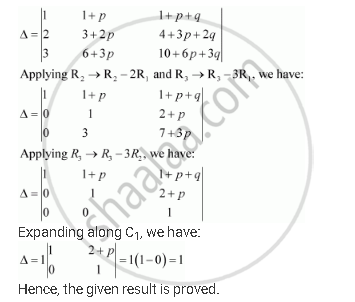Advertisements
Advertisements
प्रश्न
Using properties of determinants, prove that:
`|(1, 1+p, 1+p+q),(2, 3+2p, 4+3p+2q),(3,6+3p,10+6p+3q)| = 1`
उत्तर

APPEARS IN
संबंधित प्रश्न
Using the properties of determinants, prove the following:
`|[1,x,x+1],[2x,x(x-1),x(x+1)],[3x(1-x),x(x-1)(x-2),x(x+1)(x-1)]|=6x^2(1-x^2)`
By using properties of determinants, show that:
`|(1,1,1),(a,b,c),(a^3, b^3,c^3)|` = (a-b)(b-c)(c-a)(a+b+c)
Evaluate `|(x, y, x+y),(y, x+y, x),(x+y, x, y)|`
Evaluate `|(1,x,y),(1,x+y,y),(1,x,x+y)|`
Using properties of determinants, prove that
`|(a^2 + 2a,2a + 1,1),(2a+1,a+2, 1),(3, 3, 1)| = (a - 1)^3`
Using properties of determinants, prove that:
`|(1+a^2-b^2, 2ab, -2b),(2ab, 1-a^2+b^2, 2a),(2b, -2a, 1-a^2-b^2)| = (1 + a^2 + b^2)^3`
Using properties of determinants show that
`[[1,1,1+x],[1,1+y,1],[1+z,1,1]] = xyz+ yz +zx+xy.`
Using properties of determinants, prove the following :
Using propertiesof determinants prove that:
`|(x , x(x^2), x+1), (y, y(y^2 + 1), y+1),( z, z(z^2 + 1) , z+1) | = (x-y) (y - z)(z - x)(x + y+ z)`
Using properties of determinants, prove the following:
`|(a, b,c),(a-b, b-c, c-a),(b+c, c+a, a+b)| = a^3 + b^3 + c^3 - 3abc`.
Using properties of determinants, show that `|("a" + "b", "a", "b"),("a", "a" + "c", "c"),("b", "c", "b" + "c")|` = 4abc.
Solve the following equation: `|(x + 2, x + 6, x - 1),(x + 6, x - 1,x + 2),(x - 1, x + 2, x + 6)|` = 0
Without expanding determinants, find the value of `|(2014, 2017, 1),(2020, 2023, 1),(2023, 2026, 1)|`
Without expanding determinants, prove that `|("a"_1, "b"_1, "c"_1),("a"_2, "b"_2, "c"_2),("a"_3, "b"_3, "c"_3)| = |("b"_1, "c"_1, "a"_1),("b"_2, "c"_2, "a"_2),("b"_3, "c"_3, "a"_3)| = |("c"_1, "a"_1, "b"_1),("c"_2, "a"_2, "b"_2),("c"_3, "a"_3, "b"_3)|`
Find the value (s) of x, if `|(1, 4, 20),(1, -2, -5),(1, 2x, 5x^2)|` = 0
Without expanding the determinants, show that `|(x"a", y"b", z"c"),("a"^2, "b"^2, "c"^2),(1, 1, 1)| = |(x, y, z),("a", "b", "c"),("bc", "ca", "ab")|`
Without expanding evaluate the following determinant:
`|(1, "a", "b" + "c"),(1, "b", "c" + "a"),(1, "c", "a" + "b")|`
Prove that `|(x + y, y + z, z + x),(z + x, x + y, y + z),(y + z, z + x, x + y)| = 2|(x, y, z),(z, x, y),(y, z, x)|`
Using properties of determinant show that
`|(1, log_x y, log_x z),(log_y x, 1, log_y z),(log_z x, log_z y, 1)|` = 0
Without expanding determinants show that
`|(1, 3, 6),(6, 1, 4),(3, 7, 12)| + 4|(2, 3, 3),(2, 1, 2),(1, 7, 6)| = 10|(1, 2, 1),(3, 1, 7),(3, 2, 6)|`
Select the correct option from the given alternatives:
The value of a for which system of equation a3x + (a + 1)3 y + (a + 2)3z = 0 ax + (a +1)y + (a + 2)z = 0 and x + y + z = 0 has non zero Soln. is
Select the correct option from the given alternatives:
`|("b" + "c", "c" + "a", "a" + "b"),("q" + "r", "r" + "p", "p" + "q"),(y + z, z + x, x + y)|` =
Answer the following question:
Evaluate `|(2, 3, 5),(400, 600, 1000),(48, 47, 18)|` by using properties
Answer the following question:
Without expanding determinant show that
`|(x"a", y"b", z"c"),("a"^2, "b"^2, "c"^2),(1, 1, 1)| = |(x, y, z),("a", "b", "c"),("bc", "ca", "ab")|`
Evaluate: `|(3x, -x + y, -x + z),(x - y, 3y, z - y),(x - z, y - z, 3z)|`
The maximum value of Δ = `|(1, 1, 1),(1, 1 + sin theta, 1),(1 + cos theta, 1, 1)|` is ______. (θ is real number)
If x, y, z ∈ R, then the value of determinant `|((2x^2 + 2^(-x))^2, (2^x - 2^(-x))^2, 1),((3^x + 3^(-x))^2, (3^x -3^(-x))^2, 1),((4^x + 4^(-x))^2, (4^x - 4^(-x))^2, 1)|` is equal to ______.
If cos2θ = 0, then `|(0, costheta, sin theta),(cos theta, sin theta,0),(sin theta, 0, cos theta)|^2` = ______.
The determinant `|(sin"A", cos"A", sin"A" + cos"B"),(sin"B", cos"A", sin"B" + cos"B"),(sin"C", cos"A", sin"C" + cos"B")|` is equal to zero.
The determinant `abs (("a","bc","a"("b + c")),("b","ac","b"("c + a")),("c","ab","c"("a + b"))) =` ____________
The value of the determinant `abs ((alpha, beta, gamma),(alpha^2, beta^2, gamma^2),(beta + gamma, gamma + alpha, alpha + beta)) =` ____________.
Using properties of determinants `abs ((1, "a", "a"^2 - "bc"),(1, "b", "b"^2 - "ca"),(1, "c", "c"^2 - "ab")) =` ____________.
In a third order matrix B, bij denotes the element in the ith row and jth column. If
bij = 0 for i = j
= 1 for > j
= – 1 for i < j
Then the matrix is
By using properties of determinant prove that `|(x+y,y+z,z+x),(z,x,y),(1,1,1)|` = 0
Without expanding determinant find the value of `|(10,57,107),(12,64,124),(15,78,153)|`
Without expanding the determinant, find the value of `|(10,57,107),(12,64,124),(15,78,153)|`
Without expanding evaluate the following determinant.
`|(1, a, b+c), (1, b, c+a), (1, c, a+b)|`
